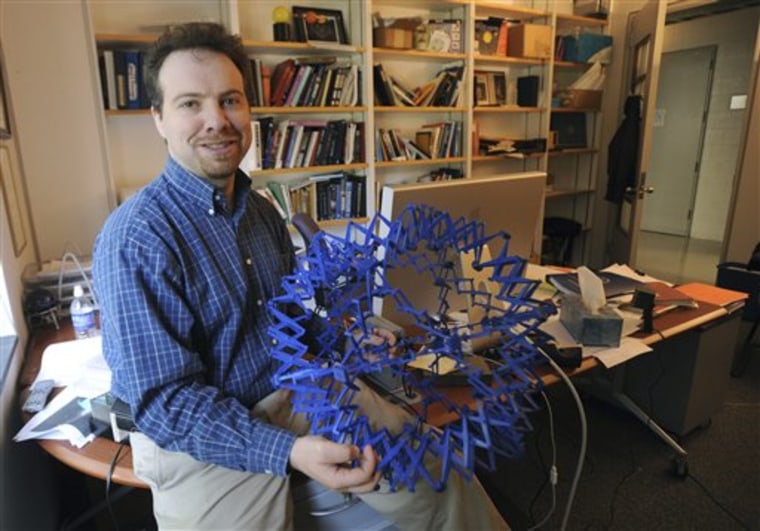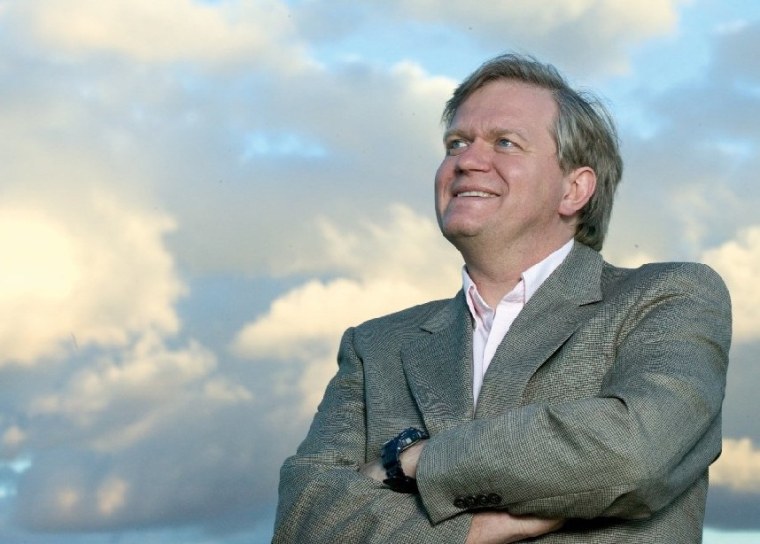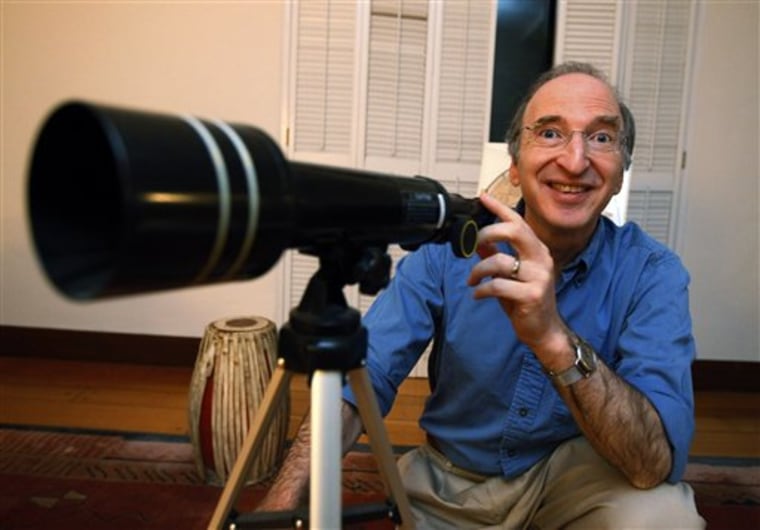Three U.S.-born scientists won the Nobel Prize in physics Tuesday for discovering that the universe is expanding at an accelerating pace, a stunning revelation that suggests the cosmos could be headed for a colder, bleaker future, nearly devoid of light.
In 1998, findings reported by Saul Perlmutter, Brian Schmidt and Adam Riess overturned the conventional idea that the expansion was slowing down 13.7 billion years after the big bang.
Their discovery raised a question: What is pushing the universe apart? Scientists have labeled it "dark energy," but nobody knows what it is.
It's "an enigma, perhaps the greatest in physics today," the Nobel committee said.
Perlmutter, 52, of the Lawrence Berkeley National Laboratory and University of California, Berkeley, will receive half the $1.5 million prize. The other half will go to Schmidt, 44, at the Australian National University in Weston Creek, Australia, and Riess, 41, an astronomy professor at Johns Hopkins University and Space Telescope Science Institute in Baltimore.
The scientists worked on two teams — one headed by Perlmutter, the other led by Riess and Schmidt. They raced to measure the universe's expansion by analyzing light from dozens of exploding stars called supernovae. They found the light was weaker than expected, signaling that the expansion of the universe was accelerating.
It was "one of the truly great discoveries in the history of science, and one whose implications are not fully understood," said Paul Steinhardt, a physics professor at Princeton University.
Dark age coming?
One consequence of the finding could be that in a trillion years, galaxies will be spread apart from each other by more than the current size of the universe, Steinhardt said. And the ever-greater expansion rate means that the light from one galaxy will no longer be visible from another as it is today, he said.
"It's like changing from New York City to suddenly where everyone is spread out across some huge desert and there's nothing around to view," Steinhardt said.
The rapid expansion also implies that the universe will get increasingly colder as matter spreads across ever-vaster distances in space, said Lars Bergstrom, secretary of the Nobel physics committee.
The committee, citing the Robert Frost poem that pondered the world ending in fire or ice, suggested that "if the expansion will continue to speed up, the universe will end in ice."

'Big rip'? Let's hope not
But Robert Kirshner, a Harvard astronomer who was part of the team that included his former students Schmidt and Riess, said scientists don't know enough about dark energy to predict what will happen to the universe hundreds of billions of years from now.
One possibility is that the expansion will continue to accelerate, he said, "sort of like compound interest gone mad." It could even speed up so much that not only will galaxies fly apart from each other, but "stuff will really rip apart," even planets and atoms, he said. That's called the "big rip," "and I hope that's not our fate."
On the other hand, Kirshner said, the expansion could halt and go into reverse, so the universe collapses back into itself, a fate sometimes called the "big crunch."
With such uncertainty, he said, "it seems very important to learn more about what the dark energy is."
'My knees sort of went weak'
Schmidt said he was just sitting down to have dinner with his family in Canberra, Australia, when the phone call came from the academy.
"I was somewhat suspicious when the Swedish voice came on," Schmidt said. "My knees sort of went weak and I had to walk around and sort my senses out."
Riess said his "jaw dropped" when he got an early morning call at his home in Baltimore from a bunch of Swedish men. "I knew it wasn't Ikea," he said, referring to the Swedish furniture retailer.
Perlmutter said his team made the discovery in steps, analyzing the data and assuming it was wrong.
"And after months, you finally believe it," he said. "It's not quite a surprise anymore. I tell people it's the longest 'Aha!' experience that you've ever had."
Fred Dylla, executive director of the American Institute of Physics, said the discovery confirmed an idea from Albert Einstein called the cosmological constant. Einstein included this in his general theory of relativity, a cornerstone of modern physics, because he thought it was required to explain why the universe didn't crash in on itself. When he found out that the universe was actually expanding outward, he called the cosmological constant his "biggest blunder."
However, the concept has been revived because of the discovery that the universe's expansion appeared to be picking up speed. Riess said the cosmological constant offers the best explanation for current observations.
"But the truth is, all bets are off," he told Reuters. "The universe could still recollapse."

Debates over the Nobel
The physics prize was the second Nobel to be announced this year. On Monday, the medicine prize went to American Bruce Beutler and French scientist Jules Hoffmann, who shared it with Canadian-born Ralph Steinman for their discoveries about the immune system. Steinman died three days before the announcement, but since his death was not known to the committee members, they decided he should keep the Nobel. Since 1974, Nobels have been awarded only to living scientists.
Tuesday's prize announcement sparked another debate about the Nobel procedures. Martin Rees, Britain's Astronomer Royal, criticized the committee's rule that no more than three people could share an award. Scores of scientists were part of the two collaborations involved in the supernova studies.
"It would have been fairer, and would send a less distorted message about how this kind of science is actually done, if the award had been made collectively to all members of the two groups," Rees said.
The Nobel Prizes were established in the will of Swedish industrialist Alfred Nobel and have been awarded since 1901. The chemistry, literature and peace prizes are due to be announced on Wednesday, Thursday and Friday, respectively, and the economics prize will be revealed on Monday. The prizes are presented to the winners every year on Dec. 10, the anniversary of Nobel's death in 1896.
More about the accelerating universe:
- Could the accelerating universe be merely an illusion?
- Mysterious dark energy demystified
- 1998: Supernova discovery rates as top breakthrough
- All about dark energy on msnbc.com
This report includes information from The Associated Press, Reuters and msnbc.com.
